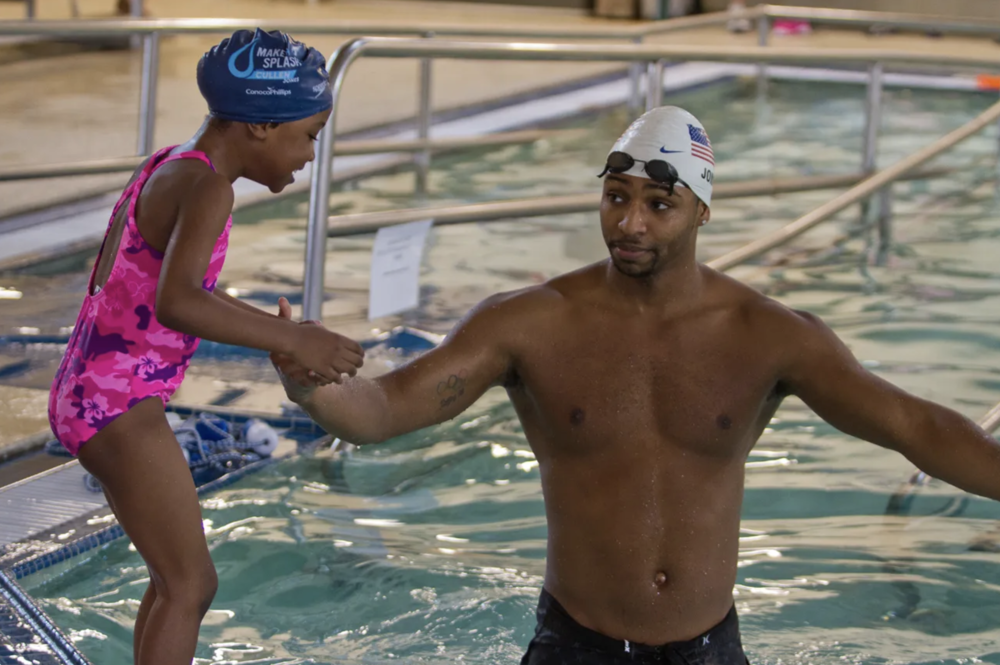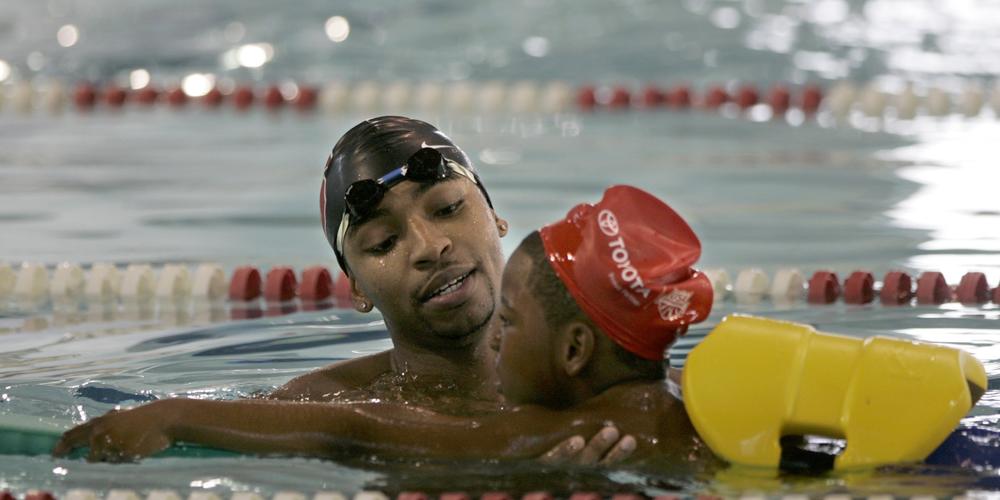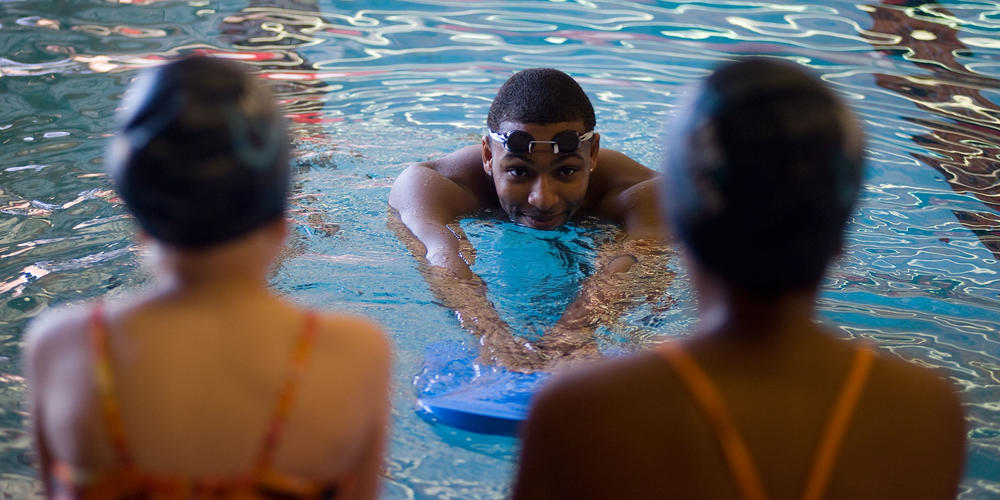
Caption
Four-time Olympic gold and silver medalist Cullen Jones advocates for drowning prevention, especially for inner city children.
Credit: THE USA SWIMMING FOUNDATION'S "MAKE A SPLASH" INITIATIVE
LISTEN: According to the USA Swimming Foundation, 64% of Black children in the U.S. cannot swim. Olympic swimmer Cullen Jones is on a mission to change that. GPB's Leah Fleming talks to him about it.

Four-time Olympic gold and silver medalist Cullen Jones advocates for drowning prevention, especially for inner city children.
According to a 2017 study commissioned by the USA Swimming Foundation, 64% of Black children in the United States cannot swim. That's compared to 40% for white children. And Black children are almost six times more likely to drown in a swimming pool than white children. So, what is behind the disparity? And most importantly, what can we do to keep all children safe in the water?
Four-time Olympic gold and silver medalist Cullen Jones says he has the answer. He is the first African American to hold a world record in swimming. As a 5-year-old child, he nearly drowned at a water park. Now Jones advocates for drowning prevention, especially for inner city children. He serves as an ambassador for the USA Swimming Foundation's Make a Splash tour. He spoke to GPB Morning Edition host Leah Fleming.
This transcript has been edited for length and clarity.

Olympic swimmer Cullen Jones, left, teaches Jamiya Hoyt, 9, of Houston, and four other students from Johnson Elementary School some basic swimming techniques at MacArthur Senior High School on Tuesday, May 19, 2009, in Houston. Cullen is helping launch a national water safety campaign.

In this Sept. 25, 2007, file photo, Olympic swimmer Cullen Jones, left, teaches water safety to Jaquil Wise, 7, at the pool in Newark, N.J., where Jones learned to swim. Jones won a gold medal at the Olympics on the U.S. men's 400 meter relay team at the Beijing Olympics Monday, Aug. 11, 2008.

Olympic swimmer Cullen Jones teaches five students from Johnson Elementary School some basic swimming techniques at MacArthur Senior High School on Tuesday, May 19, 2009, in Houston. Cullen is helping launch a national water safety campaign. Youth drownings are on the rise in Houston.



Cullen Jones: Most parents tend to, when they have a negative experience around water, they shield their children — by thinking that they're doing a good job as parents — shielding their children from the water. But when I nearly drowned, my parents said, "Nope, we're going to get him swim lessons, we're going to make sure that he's safer in the water." And that's really what this message is about, what I've been a very big ambassador for; for USA Swimming Foundation and Phillps 66 about changing this narrative. Swimming is not something that we should be veering away from. It's something that we need to learn, to respect. The best way to do that is by having swim lessons.
Leah Fleming: So I think you hit on something, when we talk about why are so many Black children — not all, but so many not learning to swim the same way other children are learning. And I think one of the things you hit on is that fear of water and parents not knowing how to swim.
Cullen Jones: Absolutely. The University of Memphis and UNLV did a study back in 2013, but they did it again in 2018. There were three major reasons why we saw people of color kind of steering away from the water. One, of course, as we said, is fear. The second one is parental backing. And then the third one being physical appearance. And when it comes to fear, sometimes when it comes to children or even adults, they've had negative experiences around the water. They just don't want to be near it. They think of it as fire hot, Stay away. I'm just not going to touch the water again. What we have found is that children do not feel this way. I've been doing this for 15 years. Every place that I go the first question I ask is "How many of you like to be near the water?" There's not one hand that doesn't shoot up in the air. Children love the water. They will find ways to get near it. We need to change this narrative of, "Oh, we'll just protect them." You're not protecting them by telling them not to be near water. You're protecting them by having them do formalized swim lessons.
Leah Fleming: So, you know, I technically would have to tell you I don't know how to swim. And, you know, I'm a grown woman. ... My parents tried to get me swimming lessons as a kid. I went again in college to learn how. I have a fear of the water. I fear that I'm going to fall to the bottom and, you know, I feel like I'm too heavy for the water. I'm going to fall, I'm going to drown. And that anxiety, I think, creates something where I can't swim, you know? So what would you tell me to do?
Cullen Jones: Well, for one, we need to find the right person to teach us, OK? So for me, nearly drowning at 5, I went through five different teachers before I started feeling comfortable around the water. So I empathize with you, when you said that you went back and tried to do it in college, and tried to do it when you were younger. All of these times of trying, you just might not have had the teacher that worked. But the biggest message that I would give you is that does not mean you should give up. It is never too late. My mom is in her 60s learning to swim.
Leah Fleming: So I think another reason why there are a number of Black children not learning to swim is access to pools. You know, in some of the communities that we have around Georgia, especially the lower-income ones, there are just no access to really good pools. And I think this comes from systemic racism. ... Have you seen that, that there's just no access to educators, you know, swimming lessons? Who's going to teach?
Cullen Jones: Absolutely. ... Right now, after COVID, there is a lifeguard shortage, There is a teacher shortage. We completely understand that. But this has been a problem well before COVID. And yes, access may be an issue. When I was growing up, I had to take two public buses to get to practice, to get to swimming. So I do understand that, but although access may be an issue, the bigger issue is not access. The bigger issue is that we do not hold swimming as a life skill in our development when it comes to children. I believe that that is the biggest issue. We do not think of swimming as development. You learn to walk, you learn to talk, you learn to eat. You learn to swim. Once we can start adding that into the development, then it becomes less of an issue. ... I know a lot of families that can figure out how to get their kids certain things that their kids prioritize and that their families prioritize. They prioritize, you know, going to the mall, getting really nice sneakers that I'm not going to say. But they tell me, "[swimming lessons are] so expensive." So are those sneakers. ... Yes, swimming is an amazing sport, but it's also a life skill. We need to do better with understanding that we do swim because the bigger problem isn't necessarily access. It's the fact that we still say to ourselves, after systemic racism, Black people don't swim. That's the problem.
Cullen Jones is a retired Olympic swimmer.
This year, the USA Swimming Foundation partnered with one American Financial Partners in a $1 million initiative to develop programs to teach children to swim in communities served by HBCUs.